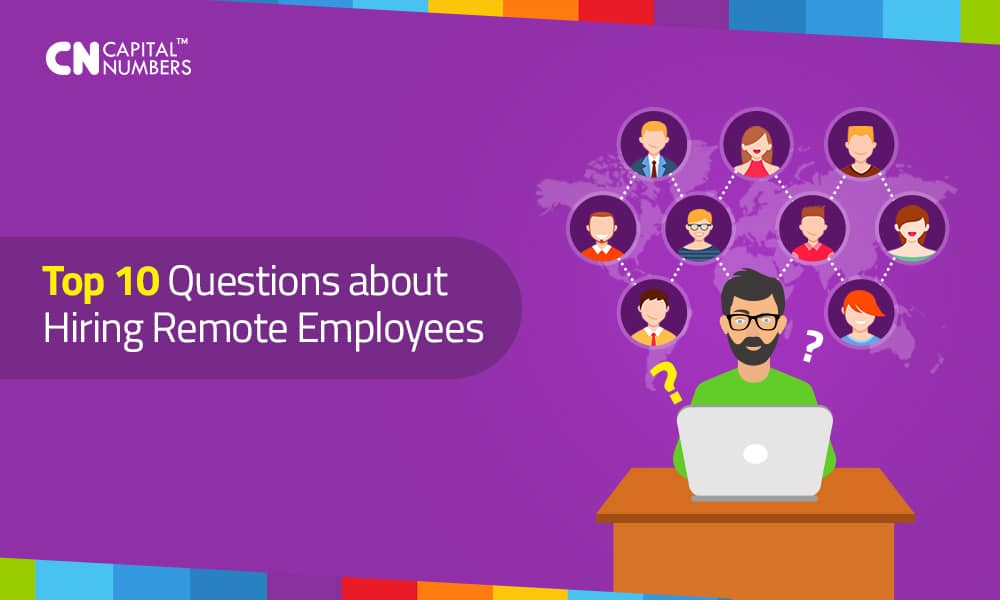Top 10 Questions About Hiring Remote Employees
There can be a lot of confusion when hiring a remote employee. It’s such an unconventional position, so knowing how to approach hiring someone like that can be difficult. Here are the answers to some of the most frequently asked questions on the subject:
1. How much freedom should a remote employee have?
The key is to let the employee know that you trust them. The goal is to let them work their hours and complete the task under the guidelines you have established with them. They shouldn’t have to feel like you’re hovering over them every step of the way. Treat them like you would any other employee; ask about their personal life and show genuine interest in what they do.
2. What questions should I ask during the interview?
For the most part, treat it like any other face-to-face interview, asking the typical questions you would when hiring someone locally. Some important topics to ask concern the person’s motivation (are they a self-motivated worker), if they already have the necessary equipment for the job, what hours they plan to work, and how quickly they usually answer emails or other important messages. You may want to see their portfolio of their last successful projects. One particularly pertinent question to ask would concern how they would handle a sudden problem; have they ever had to come up with a solution to an issue on the fly and if they did, what did they do? Knowing how well they work under pressure can give you some peace of mind if something like what they described happens when they’re on the job. If you’re hiring a remote developer, ask about their experience in standard coding languages like JavaScript. Are they better with developing for the frontend or the backend? Ask them about what kind of projects they enjoy working on and what you as a client can do to help them succeed.
3. How can I keep track of their work?
While it’s alright to check in and see the progress you’re employee is making, you don’t want them to feel like they’re constantly under your prying eyes every waking hour. Ultimately, you want to maintain a set of trust between you and the employee; you expect that they will complete the task and they should be able to trust you to let them do the job within the guidelines you gave them.
This line of trust is broken with programs that monitor their activity and take periodic screenshots of their computer. It creates a sense of fear of the client, and this is unhealthy for the relationship between business and employee. Remote workers should have the freedom to work without the constant threat of being under heavy surveillance every second of the day.
With Google Drive or other programs that let everyone within a group see each others work, you can quickly see how much or little progress they are making on their task at a glance. At the very least, check in with them via phone call or other means of communication that both of you have agreed upon. You can also have them email you at regular intervals with updates on how their project is coming along. Additionally, there are some great time-tracking apps your remote employee can use to accurately tell you how long they’re working on your project.
4. What’s the best way of contacting a remote employee?
Because you don’t have the luxury of being in the same building for 8 hours of the day, you’ll need some way of communicating quickly if there’s a catastrophic development that requires their immediate attention. It all comes down to what is most convenient for you as the client. If you’ve already found a system of communication that you regularly use, teach the employee how you use it so everyone in your company will be on the same page.
Texting and IMing are fine, but can easily be read and forgotten about until it’s too late. A phone or Skype call requires them to act instantly, ensuring that you’ll get their attention right away. Knowing what situations call for which form of communication is the key to getting the responses you need when you need them.
5. What do I do if my remote employee suddenly drops contact?
First off: keep calm! Don’t assume the worst right away. There are an infinite number of reasons why they aren’t responding to emails or any other messages. Maybe they just lost a loved one and had to leave on short notice or it could be that they lost their phone at the airport. During the interviewing phase, ask them to provide you with multiple ways to contact them. At least three different modes of communication should be enough. If they don’t get back to you in a week, then you should start trying to find out if everything is okay on their end. Before they even begin work, you should ask for an emergency contact, so if something like this does happen, you’ll have some way of contacting someone who may know what the problem is.
Keep in mind that they might be dealing with something completely out of their control, as was the case in 2012 with Hurricane Sandy. Thousands of freelancers were unable to contact their employers because of the lack of internet access. For many, this unfortunately resulted in them losing their position just because they couldn’t contact their clients to let them know what was happening.
6. How can I make them care about my brand?
It can be difficult to influence remote employees to care genuinely about your company and its image. If you want someone to gain the same appreciation and passion that you have for your brand, you’re going to need to put in the time to treat your employees as more than just the people that keep the lights on; build relationships with them and ask for their opinion about day-to-day operations. Do they see any areas that need improvement? What would make their job easier? Let them know about what kind of values you have established within your company so they know what’s important to you.
7. Should I seek out a freelancer or go through an agency?
There are definite pros and cons to both options. An agency is a whole company that hires out their staff to other companies, whereas a freelancer is on their with no company behind them. The teams working under agency tend to turn out consistent work, so if you end up liking the work they produce, you’ll get the same results when you hire them again. Hiring a freelancer is a bit like playing a slot machine: you might win big, but there’s a larger chance you’ll hit bust. Finding a freelancer that shares your passion is hard. More likely than not, they’ll be approaching your task with the mindset of it being just another job.
8. What’s the best way I can let my remote employee know my expectations?
You don’t want to feel like your remote employees are walking all over you, so be sure to let them know what you expect of them right from the get-go. You can’t exactly control when in the day they get the work done, but you can decide how it needs to be completed. Be firm about how and possibly why their job needs to be done in the way you want it to be.
For offshore-based employees, it helps to be clear and concise. Use bullet points to quickly get the point across without making them read through walls of text explaining why this task is so important. Just give them the basics so that they know what you want and how it needs to be done.
9. How do I know I need a remote employee?
Before looking for outside help, focus on your in-house team first. Build a group that has strength in everything your company needs. If your business is beginning to expand and its needs change over time, that’s when you should start to consider hiring remote employees.
Examine the strengths of your team and find out where the weak spots are. Do you lack the expertise of a seasoned graphic designer? You might want to look into hiring someone for that. Do you have trouble writing coherent sentences for content? A remote employee can help you with that.
Another definite sign of the need for a remote employee is determining how much everyone can get done. If everyone is stretched too thin across multiple projects or you have a long backlog of projects, you might want to have someone from outside the team come in and work on it for you.
A problem arises when remote employees become the backbone of your company. Say you have an idea for a revolutionary new app, but don’t have any of the experience to make it yourself. You decide to hire some remote developers to build your dream app. Herein lies the problem: you are now relying on a handful of people spread across the world to build an app from scratch while you are in charge of managing all these people at once.
10. Is there a surefire way of telling if a remote employee is trustworthy?
There’s no guaranteed way of knowing whether someone is completely reliable or not. There are some steps you can take to find out if the person you’re looking to hire is reputable, though. Ask them to provide you with work references so that you can get in contact with the people they’ve previously worked with. Find out from their previous bosses what their work ethic was, the quality of their work, and the overall impression they made on the employer.
Hopefully these answers will resolve any uncertainties you may have had regarding remote employees. More and more companies are embracing the exciting possibilities that come with hiring great workers from all around the world. Now that you know the facts, it’s time to get hiring!













